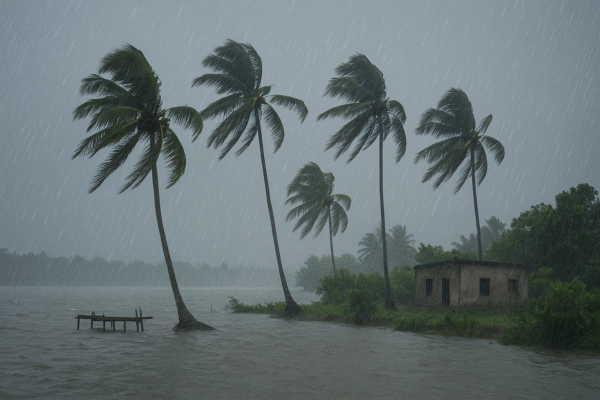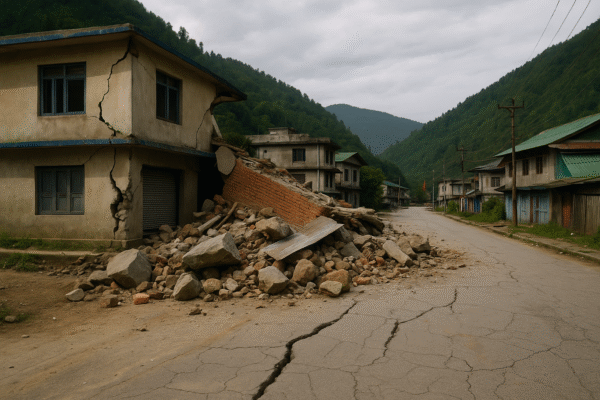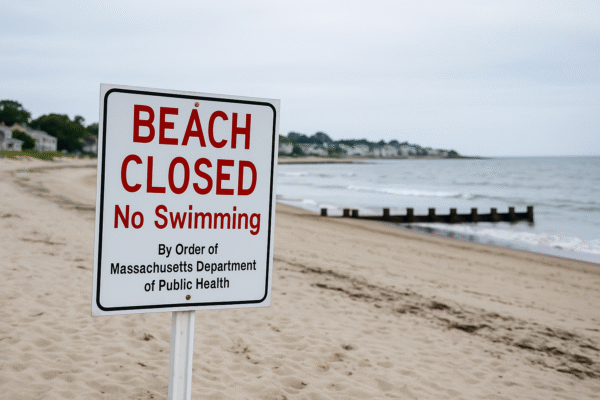Massachusetts is grappling with a major tourism crisis this summer as more than 40 public beaches have been shut down due to unsafe water conditions. With the state’s Department of Public Health (DPH) reporting elevated bacteria levels across a wide range of popular coastal destinations, including parts of Boston, Quincy, and Swampscott, local tourism businesses and vacationing families are facing massive disruptions.
As beachgoers flock to the coast during peak season, many are instead met with warning signs and empty shorelines. The closures, compounded by the complete shutdown of Walden Pond’s main beach due to ongoing infrastructure development, are delivering a heavy blow to one of the Bay State’s most lucrative summer sectors: coastal tourism.
What’s Causing the Closures?
The DPH conducts routine testing on beach water quality during the warmer months. A surge in bacterial contamination—particularly enterococci, which can indicate the presence of fecal matter—has led to the temporary closure of dozens of beaches. Exposure to such bacteria can cause a range of health problems, from minor skin rashes and ear infections to gastrointestinal illnesses and respiratory complications.
One of the largest contributing factors to the spike in bacterial levels is this summer’s persistent rainfall. Heavy downpours result in stormwater runoff that carries pollutants such as pet waste, fertilizer, and even raw sewage into coastal waters. Aging septic systems and illegal sewer hookups further worsen contamination, especially in densely developed urban beach areas.
Infrastructure Projects Add to the Strain
Compounding the health crisis is the long-term closure of Walden Pond’s primary beach, one of the most historically significant and frequently visited inland swimming spots in Massachusetts. The $6.1 million project to build a new, modern bathhouse will keep the beach closed throughout the entire 2025 summer season.
While the improvements are intended to enhance the visitor experience in the future, the timing could not be worse for local tourism-dependent businesses. Thousands of annual visitors to the pond will be redirected elsewhere—or may cancel travel altogether.
Economic Impact on the Local Tourism Sector
According to the Massachusetts Office of Travel and Tourism, the state’s travel sector generated $24.2 billion in direct spending in recent years, with beach tourism contributing a major share. Cape Cod, Nantucket, and Martha’s Vineyard typically attract droves of summer visitors from across the U.S. and abroad.
However, local hotels, resorts, and vacation rentals are already reporting a rise in cancellations and fewer advance bookings due to the closures. Restaurants, souvenir shops, and boat tour operators are also feeling the pinch, with some anticipating a 20–30% drop in seasonal revenue.
“In 20 years of business, we’ve never seen so many beach closures at once,” said a hotel manager in Cape Cod. “Guests are calling ahead to cancel, and we’re seeing a ripple effect across all services.”
Public Health Risks and Travel Advisory
While not all beaches are closed, DPH officials urge the public to check updated water quality report. Swimmers are advised to avoid contact with water in affected areas and refrain from entering the ocean when warning signs are posted—even if lifeguards are present.
Health officials also stress the risks of ignoring these warnings. Ingesting contaminated water can lead to symptoms such as fever, nausea, vomiting, and severe dehydration. Children, the elderly, and immunocompromised individuals are particularly vulnerable.
How Tourists Can Adapt and Help
Despite the closures, Massachusetts still offers a wide range of outdoor and cultural attractions. Travelers can explore the Freedom Trail in Boston, visit the witch museums of Salem, bike along the Cape Cod Rail Trail, or enjoy inland activities like kayaking and wildlife spotting.
Tourists can also do their part in preserving water quality. Local authorities are urging visitors to:
- Clean up pet waste properly
- Avoid using lawn fertilizers and pesticides near water bodies
- Dispose of trash responsibly
- Support eco-friendly tourism practices
Massachusetts Environmental Protection Agency (MassDEP) has launched a public awareness campaign aimed at educating residents and visitors on reducing pollution that contributes to runoff.
Long-Term Outlook and Call to Action
The Massachusetts government is currently reviewing additional funding for wastewater infrastructure upgrades and coastal resilience projects. Collaboration with local municipalities and environmental groups is ongoing to improve drainage systems and implement green stormwater practices.
Tourism officials and environmental agencies alike agree: proactive investment in infrastructure and education is critical for the long-term sustainability of the state’s beaches and economy.
As the closures persist, many hope that this summer serves as a wake-up call—not only for Massachusetts but for coastal states across the U.S.—to prepare for the dual challenges of environmental degradation and climate change.
For more travel news like this, keep reading Global Travel Wire
















